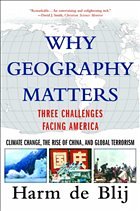Over the next half century, the human population, divided by culture and economics and armed with weapons of mass destruction, will expand to nearly 9 billion people. Abrupt climate change may throw the global system into chaos; China will emerge as a superpower; and Islamic terrorism and insurgency will threaten vital American interests. How can we understand these and other global challenges? Harm de Blij has a simple answer: by improving our understanding of the world's geography.
De Blij demonstrates how geography's perspectives yield unique and penetrating insights into the interconnections that mark our shrinking world. Centuries ago a surge of climate change halted China's maritime plans; more recently, environmental calamity altered the course of geopolitical events in East Asia; today, terrorists look for failed and malfunctioning states to base their operations--and some of these are in our own hemisphere.
Preparing for climate change, averting a cold war with China, defeating terrorism: all of this requires geographic knowledge. In Why Geography Matters, de Blij makes an urgent call to restore geography to America's educational curriculum. He shows how and why the U.S. has become the world's most geographically illiterate society of consequence--and demonstrates that this geographic illiteracy is a direct risk to America's national security.
In this personal and engaging book, de Blij provides a geographer's perspective on the challenges of this new century. As he states, "We are crossing the threshold to a century that will witness massive environmental change, major population shifts, persistent civilizational conflicts [and] while geographic knowledge by itself cannot solve these problems, they will not be effectively approached without it."
De Blij demonstrates how geography's perspectives yield unique and penetrating insights into the interconnections that mark our shrinking world. Centuries ago a surge of climate change halted China's maritime plans; more recently, environmental calamity altered the course of geopolitical events in East Asia; today, terrorists look for failed and malfunctioning states to base their operations--and some of these are in our own hemisphere.
Preparing for climate change, averting a cold war with China, defeating terrorism: all of this requires geographic knowledge. In Why Geography Matters, de Blij makes an urgent call to restore geography to America's educational curriculum. He shows how and why the U.S. has become the world's most geographically illiterate society of consequence--and demonstrates that this geographic illiteracy is a direct risk to America's national security.
In this personal and engaging book, de Blij provides a geographer's perspective on the challenges of this new century. As he states, "We are crossing the threshold to a century that will witness massive environmental change, major population shifts, persistent civilizational conflicts [and] while geographic knowledge by itself cannot solve these problems, they will not be effectively approached without it."

